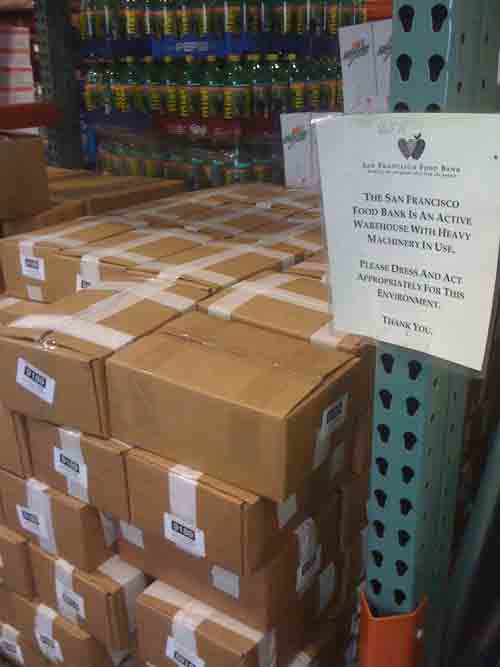
Yesterday on leaving the San Francisco Food Bank after putting in our orders for the church food pantry, I was given a handout:
Let me decode that communication.Over the past couple of months, the inventory level on the shop floor has been down. [For example,] granola bars have been non-existent., the flow of Capri Suns has become unstable...The largest factor is that donations are down.
John Curry, Food Resources Manager, discussed the situation. He states that manufactures are running tighter ships in their production lines and the big corporations spending less on promotional items in today's tight market. In addition, he also commented about the increased competition with "dollar store" retailers as companies try to milk every dollar they can for their product.
The Food Bank collects and centralizes corporate food producer and vendor donations of unsold food. The donors get a tax credit. The agencies and pantries that distribute food get the food (and frequently other curiosities like vitamin water) though a centralized distribution point.

In the current Great Recession (don't try to tell me this is over when nearly 20 percent of everyone who wants/needs to work is still hurting), U.S. corporations are using the downturn to get leaner and meaner. Improvements in communication and information collection have made it possible to more accurately predict what quantity of a product will sell. Likewise, these information improvements have made it more possible to avoid mismatches between where the foodstuffs are and where a market exists. The rise of "dollar stores" sucks up some more product. All this is genuinely efficient; getting the quantities right is more profitable than over- (or under-) production. There's less waste in the system. And the waste in the system is what used to go to the food banks.
Productivity per worker is rising at the food corporations. With the increased efficiency, it takes less workers to process and distribute the appropriate quantities of food. So some workers become waste in the system too -- and they get laid off. They become job hunters and stop being able to buy stuff. Everyone who sold them stuff takes a hit -- and the producers of the stuff are tipped off that they should avoid waste by producing less. Etc. and around we go ...
The economy is caught in a vicious circle.
What's interrupts of a vicious circle? Economists such as Paul Krugman say government should push money out into the system in the form of such direct help as unemployment checks (so laid off people keep buying food and other stuff) and an indirect stimulus such as rebuilding crumbling roads and encouraging green energy development. They think it doesn't much matter that the government will run up some debt because 1) right now, lenders are looking for borrowers and will lend cheaply and 2) if more of us were working, tax revenue could recover and get the government (us) out of much of the national debt.
This is too simple for Republicans and ConservaDems. As with health care reform, their apparent response to what's happening in the real world is, "sorry, go die." Oh, and lower taxes on the rich on your way out.
2 comments:
If there are no workers to buy the products it will eventually hit those greedy corporations that they made a pact with the devil.
If people aren't working the revenue from income and sales taxes is gone; thus further fueling the depressed economy. And that will increase the deficit as governments have to borrow to keep afloat. Why is that so hard for the Republicans to understand?
People are hurting in increasingly higher numbers, numbers that are consistently climbing since Sept 2007. At the Urban Rest Stop, www.urbanreststop.org, we have seen a steady and constant increase in demand for services of 25% per year. We are now refusing service, due to lack of capacity to 5-6 people for each person served. Our pre-9/2007 ratio was 3-4 persons for each person served from 2000-8/2007. Ronni Gilboa
Post a Comment